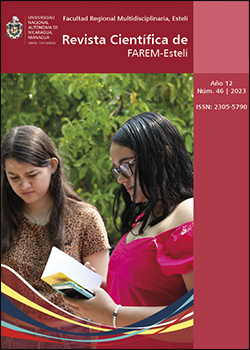Proposal of the instructional design ADDIE model in the Blended Learning modality at the Tecnológico Nacional INATEC Matagalpa Nicaragua
DOI:
https://doi.org/10.5377/farem.v12i46.16480Keywords:
Instructional design, Blended Learning modality, ADDIE modelAbstract
The Government of Reconciliation and National Unity conceives education as the fundamental strategic axis of human and sustainable development of the country. In this context, Technical Education and Vocational Training is presented as an opportunity to make a comprehensive transformation, from awareness to improve professional levels and quality to contribute to the economic and social development of Nicaragua (SITEAL, 2018). This scientific article aims to strengthen the blended learning modality in technical education and vocational training. The methodology implemented in this research is according to the philosophical approach that is based on the systemic integration of qualitative and quantitative research methods and techniques. The research was developed in the sociocritical paradigm from the composition of the perfect binomial of 10 teachers and 68 students who made up the universe and the sample in study. According to the classification of Hernández, Fernández and Baptista (2014), the type of study is correlational. With this research, guidelines were determined to respond to the problematic axis that focuses on the low participation of students and teachers in the virtual classroom, in this process, elements were originated to define a route that complements a series of pedagogical, methodological and evaluative procedures in each of the stages of the Instructional design ADDIE model in the Blended Learning modality implemented in the module management of professional practices. This topic is relevant and belongs to the changes in educational paradigms brought about by the integration of methodologies focused on the human being, constructivist learning and students’ learning styles, as well as the integration of Information and Communication Technologies (ICT).
Downloads
References
Guerrero Z, T., & Flores H, H. (2009). Teorías del aprendizaje y la instrucción en el diseño de materiales didácticos informáticos. Mérida Venezuela. Recuperado el Marzo de 2023, de http://ve.scielo.org/scielo.php?script=sci_arttext&pid=S1316-49102009000200008
Hernandez Sampieri , R., Fernandez Collado , C., & Baptista Lucio, P. (2014). Metodologia de la investigacion (6ta ed.). Mexico. Obtenido de https://drive.google.com/file/d/0B7fKI4RAT39QeHNzTGh0N19SME0/view?resourcekey=0-Tg3V3qROROH0Aw4maw5dDQ
Mejia Madrid, G. S. (2019). El proceso de enseñanza aprendizaje apoyado en las tecnologias de la informacion: modelo para evaluar la calidad de los cursos b learning en las Universidades. Alicante. Recuperado el Julio de 2022, de https://rua.ua.es/dspace/bitstream/10045/92447/1/tesis_gina_mejia.pdf
Quezada Càceres, S., & Salinas Tapia, C. (Agosto de 2020). Modelo de retroalimentacion para el aprendizaje una propuesta revisada en revision de literatura. 26(88), 238. Recuperado el junio de 2023, de https://www.scielo.org.mx/pdf/rmie/v26n88/1405-6666-rmie-26-88-225.pdf
Alvarado, L., & Garcia, M. (Diciembre de 2008). Caracteristicas mas relevante del paradigma socioctitico: su aplicacion en investigaciones de educacion ambiental y de enseñanza de las ciencias realizada en el doctorado de educacion en el Instituto pedagogico de Caracas. Sapiens ( Revista Unniversitaria de Educacion )(2). Recuperado el Abril 2023, de file:///C:/Users/admin/Downloads/Dialnet-CaracteristicasMasRelevantesDelParadigmaSociocriti-3070760.pdf
Astudillo Ganora, B. (2017). Modelo ADDIE como apoyo al desarrollo docente instrumental en competencias TIC como plan de certificacion en estandares internacionales. Universidad de Chile Facultad de ciencias sociales, escuela de postgrado, Santiago Chile. Recuperado el Abril de 2023, de https://repositorio.uchile.cl/bitstream/handle/2250/167803/Modelo%20Addie%20como%20apoyo%20al%20desarrollo%20docente%20instrumental%20en%20competencias%20tic%20como%20plan%20de%20certificaci%C3%B3n%20en%20est%C3%A1ndares%20internacionales.pdf?sequence=1
Hamui-Sutton, A. (2013). Un acercamiento a los metodos mixtos de investigacion en educacion medica. Recuperado el Marzo de 2023, de https://www.scielo.org.mx/pdf/iem/v2n8/v2n8a6.pdf
Hernandez Sampieri, R., Fernandez Collado , C., & Baptista Lucio, P. (2014). Metodologia de la investigacion (Vol. Sexta edicion ). Mexico. Recuperado el Junio de 2023, de https://drive.google.com/file/d/0B7fKI4RAT39QeHNzTGh0N19SME0/view?resourcekey=0-Tg3V3qROROH0Aw4maw5dDQ
Muñoz Gonzales, J. P. (Marzo de 2023). Efectividad de las estrategias didácticas en la modalidad Blended Learning en el Tecnologico Nacional INATEC Matagalpa – Nicaragua. Recuperado el Abril de 2023, de Revista cientifica de FAREM Estelí: https://rcientificaesteli.unan.edu.ni/index.php/RCientifica/article/view/1561/1713
Pineda , E. B., Alvarado , E., & Canales , F. (1994). Metodología d ela Investigación. Manual para el Personal de Salud. Washington: OPS. Recuperado el Abril de 2023, de http://187.191.86.244/rceis/registro/Metodologia%20de%20la%20Investigacion%20Manual%20para%20el%20Desarrollo%20de%20Personal%20de%20Salud.pdf
Potkewitz, T. (1988). Paradigma e ideología en investigación educativa. Las funciones sociales del intelectual. Madrid: Mondadori. Recuperado el Mayo de 2022
Rendón Rojas, M. A. (1986). Problemas sobre teoriaas y epistemologia de la ciencia bibliotecologica y de la iformacion discusion y analisis. Recuperado el Junio de 2023, de https://ru.iibi.unam.mx/jspui/bitstream/IIBI_UNAM/CL1089/1/L186_Cap1.pdf
SITEAL. (2018). Modelo Nacional de Educacion tecnica y Formacion Profesional basado en competencias. Recuperado el Abril de 2023, de https://www.tecnacional.edu.ni/media/TECNACIONAL_Modelo_Nacional_de_Educaci%C3%B3n_T%C3%A9cnica_y_Formaci%C3%B3n_Profesional.pdf
Downloads
Published
Issue
Section
License
Copyright (c) 2023 Revista Científica de FAREM-Esteli

This work is licensed under a Creative Commons Attribution-NonCommercial-ShareAlike 4.0 International License.



